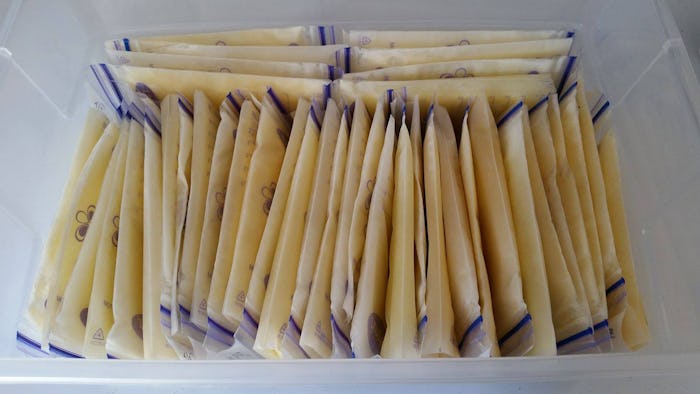Life

How To Store Frozen Breast Milk & Keep The Liquid Gold From Going To Waste
If you are one of the lucky moms who has enough of a breast milk supply to feed your baby and pump several more ounces, you may want to consider saving your excess breast milk to use at a later time. And one of the best ways to do that is by storing it in the freezer. But freezing breast milk has to be done in a particular way, and learning how to store frozen breast milk will prevent your milk from spoiling before your baby can drink it.
According to Madela, breast milk should be frozen in two to five ounce portions. This is because small amounts will thaw more quickly, you will waste less, and avoid overfeeding your baby. La Leche League International also recommended that you store the expressed milk in freezer bags that are designed for human milk. Don't use disposable bottle liners or plastic bags (sandwich or other similar bags) because there is a greater risk of contamination and leakage. You may also freeze your breast milk in glass or BPA-free hard-sided plastic containers with well-fitting tops. You should always squeeze the air out of the bag before sealing and leave one inch of space for the milk to expand.
After your fill the breast milk storage container, the experts at Lansinoh warned never to forget to write the date on the outside of the bag or top of the bottle, and advised to also write your baby's name in case you decide to send this milk with your child to daycare.
Your milk should be frozen immediately after pumping to avoid the growth of bacteria. According to CDC guidelines, breast milk will stay fresh in a deep freezer for six to 12 months, in a regular freezer for three to six months, and a freezer compartment inside the refrigerator for up to two weeks.
You should always thaw the oldest milk first according to Mayo Clinic. This will make sure that you can use all of the milk you have stored before it goes bad. In order to defrost, place the frozen container of breast milk in the refrigerator overnight. You can also warm the milk by placing in a bowl of warm water or holding it under warm running water.
Heating frozen milk in the microwave or on the stove top is not recommended by Mayo Clinic because rapid heating can cause loss of some of the milk's antibodies. Finally, make sure to use all of the thawed milk within 24 hours. Any milk that hasn't been consumed by your baby should be thrown out.
If upon warming the stored milk, you realize that it has a strange odor or taste, it can be due to an excess in a protein called lipase. Breast milk that contains excess lipase may have a shorter lifespan in the freezer. You can test your breast milk for lipase which will help you determine how long it can be stored and prevent wasting any of your precious milk supply.